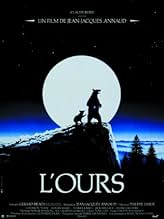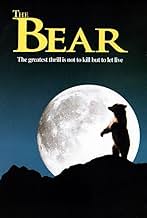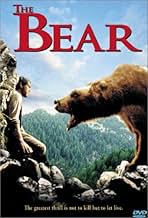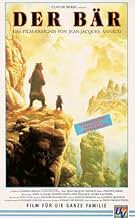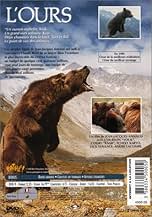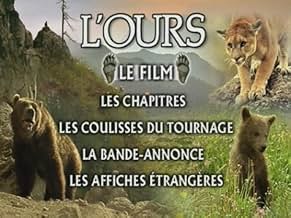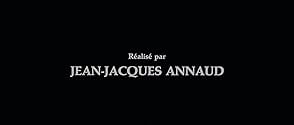- Nominated for 1 Oscar
- 5 wins & 11 nominations total
- Director
- Writers
- All cast & crew
- Production, box office & more at IMDbPro
Featured reviews
From the first moment when you see the little bear and his mom digging for honey I was entranced with this film. The whole aura of life in the wild- the mountain lions that prey on other animals and the bear is certainly an omnivore! I don't know how the filmmakers got all that great footage but I enjoyed seeing life through the eyes of the orphaned cub. The scenery is breathtaking. The hunters were almost an intrusion in the film, but in the end they helped to bring the story full circle. This film was recommened to me by a man who never reads, he waxed so about this film I had to see it and I agree it is both a nature film and an allegory on life.
A bear cub loses its mother while being fed. The orphan bear cub follows a huge male bear, being "adopted", protected and fed by the adult bear. Meanwhile, two hunters are following the big animal, which tries to evade in the mountainous forest. "The Bear" is a magnificent ecological fable, having the story developed through the eyes of the bears, which are indeed the "lead actors". I have read somewhere that it has been taken four years to Jean-Jacques Annaud prepare such a homage to the nature. Sometimes, the shooting recalls a National Geographic movie. Unfortunately the DVD released in Brazil does not have any information about the preparation of this movie. In the present days, it is hard to point out what computer makes, and what is real in a film, but it seems that the movie was shot using real trained animals. "The Bear" is another excellent work of the outstanding director Jean-Jacques Annaud and highly recommended as a perfect family entertainment and even to be presented for children in classrooms. My vote is nine.
Title (Brazil): "O Urso" ("The Bear")
Title (Brazil): "O Urso" ("The Bear")
At last a movie that seriously attempts to portray the world from a non-human point of view! It's a leap of the imagination that many of us, I'm sure, have never even contemplated. This beautifully-filmed movie, marketed as a kids' film, cannot of course undertake such a task without a few failures here and there; but whatever lapses into anthropomorphism there may be can be readily excused if one compares The Bear with, say, Milo and Otis (cringe).
The story, set in late nineteenth-century British Columbia, revolves around two bears; a young orphan and the huge male who adopts him. Much of the film has no human speech, viewers instead having to interpret the body language and sounds of wild animals. The photography is so impressive and the editing so nicely done that this is a fascinating process, reminding us just how much we as a species have in common with other animals. We can even identify with the bears' diet; they are omnivorous, as are we. Their physical actions and expressions of emotion make a compelling comparison with our own behaviour, and the filmmakers have done their utmost to retain as "natural" a feel as possible to such scenes.
The appearance of human beings, two bear hunters, comes almost as a shock after immersion in the simple world of the bears. The hunters are animals too, but unlike the bears they interact clumsily with the breathtaking wilderness in which they move; their predatory intelligence and use of weaponry have to compensate for their physical vulnerability. They are clearly aliens in an unfriendly environment, though they move as if they were the only creatures of importance within it. Bearskins are piled high in their camp, their little bastion of safety in the untamed wilderness.
These two worlds do of course collide. The hunters, in their arrogance, bite off more than they can chew when a poorly-managed encounter with the male adult bear leads them to pursue a vendetta against him. They capture the young cub to keep the adult in the area, then systematically set out to kill the creature that has caused them so much inconvenience. But the hunters have at last come up against an enemy that seems like the personification of an offended Mother Nature. In an absolutely convincing and spine-chilling scene, one of the hunters comes face to face with the reality of his position in the scheme of things in a manner in which he, and we who watch, will never forget. His teacher is The Bear; the young hunter leaves the mountains a fundamentally changed man. I have never seen the necessity of respect for our fellow creatures more ably communicated.
The movie ends with the focus once more on the young cub, who must find within himself the first glimmerings of the power his adult protector so effortlessly exudes. The humans have gone: the bears live on, their wild world unchanged by their encounter with the strange two-legged creatures that dared to intrude so unwisely into their affairs.
This beautiful and at times awe-inspiring movie is rated as children's viewing, but I would not recommend it for younger viewers. Older children and adults, however, can learn and gain much from this poignant and fascinating film. Hats off to the filmmakers, they have done their subject justice indeed.
The story, set in late nineteenth-century British Columbia, revolves around two bears; a young orphan and the huge male who adopts him. Much of the film has no human speech, viewers instead having to interpret the body language and sounds of wild animals. The photography is so impressive and the editing so nicely done that this is a fascinating process, reminding us just how much we as a species have in common with other animals. We can even identify with the bears' diet; they are omnivorous, as are we. Their physical actions and expressions of emotion make a compelling comparison with our own behaviour, and the filmmakers have done their utmost to retain as "natural" a feel as possible to such scenes.
The appearance of human beings, two bear hunters, comes almost as a shock after immersion in the simple world of the bears. The hunters are animals too, but unlike the bears they interact clumsily with the breathtaking wilderness in which they move; their predatory intelligence and use of weaponry have to compensate for their physical vulnerability. They are clearly aliens in an unfriendly environment, though they move as if they were the only creatures of importance within it. Bearskins are piled high in their camp, their little bastion of safety in the untamed wilderness.
These two worlds do of course collide. The hunters, in their arrogance, bite off more than they can chew when a poorly-managed encounter with the male adult bear leads them to pursue a vendetta against him. They capture the young cub to keep the adult in the area, then systematically set out to kill the creature that has caused them so much inconvenience. But the hunters have at last come up against an enemy that seems like the personification of an offended Mother Nature. In an absolutely convincing and spine-chilling scene, one of the hunters comes face to face with the reality of his position in the scheme of things in a manner in which he, and we who watch, will never forget. His teacher is The Bear; the young hunter leaves the mountains a fundamentally changed man. I have never seen the necessity of respect for our fellow creatures more ably communicated.
The movie ends with the focus once more on the young cub, who must find within himself the first glimmerings of the power his adult protector so effortlessly exudes. The humans have gone: the bears live on, their wild world unchanged by their encounter with the strange two-legged creatures that dared to intrude so unwisely into their affairs.
This beautiful and at times awe-inspiring movie is rated as children's viewing, but I would not recommend it for younger viewers. Older children and adults, however, can learn and gain much from this poignant and fascinating film. Hats off to the filmmakers, they have done their subject justice indeed.
"The Bear" is a rare film when it comes to the ordinary cinema that we usually view. The main characters are animals, and the connection we get from them is something no human actor could emulate. The movie is expertly crafted, especially the direction and the cinematography. The animal trainers are in a class all their own, making everyone else involved with the film seemingly a lot less talented. The film, as previously said, isn't for children, despite the PG rating. It has a fair amount of blood, peril, sadness, and some bear sex! The film is great though, and I'm so glad I found it at Walfart on DVD for $5.50! *** 1/2
I have this on video but have not watched it for quite some time, the other night I watched it again and was of course entranced. The director has captured perfectly the life of the cub. If I have one gripe it is the use of a "human" voice for the emotions of the cub, in many scenes it is fairly obvious that it is a human being trying to express the emotions of the cub at the time. Secondly, while I understand the storyline of the hunters being integral to the film to be honest I felt that every scene with humans involved was boring beyond belief and I couldn't wait for it to be over. Overall this movie is a sheer joy to behold and the final scene where the cub finally goes to sleep without nightmares is pure bliss. You have to live with animals and know animals to realize how impressive this movie is and I firmly believe that the director has captured pure magic on film. Don't miss it.
Did you know
- TriviaBecause in the wild, male bears usually eat bear cubs if they can, the filmmakers prepared the adult Bart the Bear for the cub by having him play with a teddy bear the size and fur color of the cub. When the trainers felt he was ready, he was introduced to the cub and he greeted the cub affectionately.
- GoofsAfter the bear attacks the hunters' horses, and one of the hunters has tracked down his hurt horse and has it cornered in a small rock enclosure, rocks are visible being thrown from the left side of the shot to stir the horse up.
- ConnectionsFeatured in Motormouth: Episode #2.3 (1989)
- SoundtracksEnd Title Theme
Music adapted from "June: Barcarolle"
by Pyotr Ilyich Tchaikovsky (uncredited), from "The Seasons"
Played by Orchestra
- How long is The Bear?Powered by Alexa
Details
Box office
- Gross US & Canada
- $31,753,898
- Opening weekend US & Canada
- $3,676,530
- Oct 29, 1989
- Gross worldwide
- $31,753,898
- Runtime
- 1h 36m(96 min)
- Color
- Aspect ratio
- 2.35 : 1
Contribute to this page
Suggest an edit or add missing content

![Watch Bande-annonce [OV]](https://m.media-amazon.com/images/M/MV5BZTE0ODk2YTgtMWVkYy00YTRiLTllOTctODQwYjFlNTAwNTk4XkEyXkFqcGdeQXRyYW5zY29kZS13b3JrZmxvdw@@._V1_QL75_UX500_CR0)





